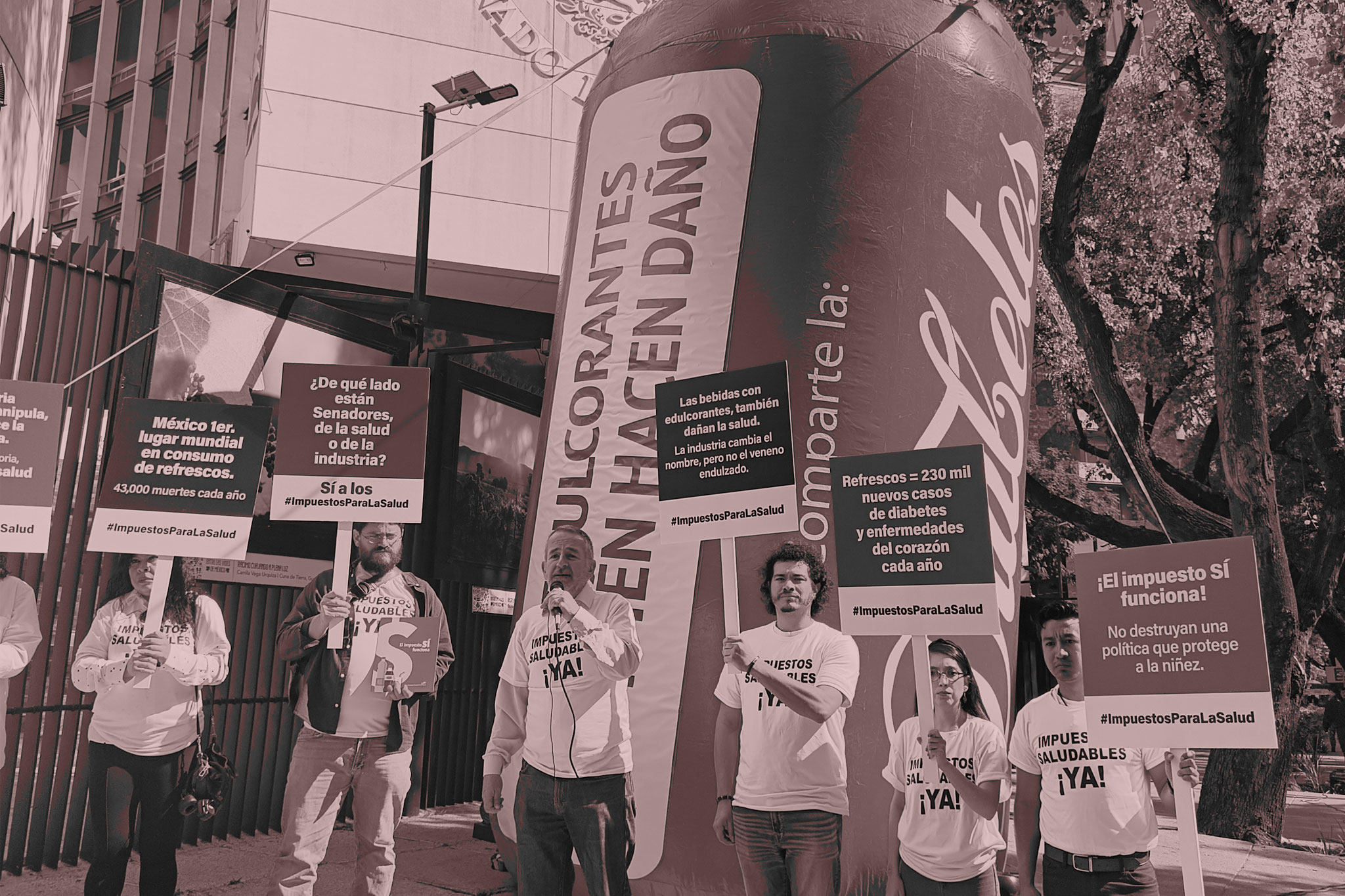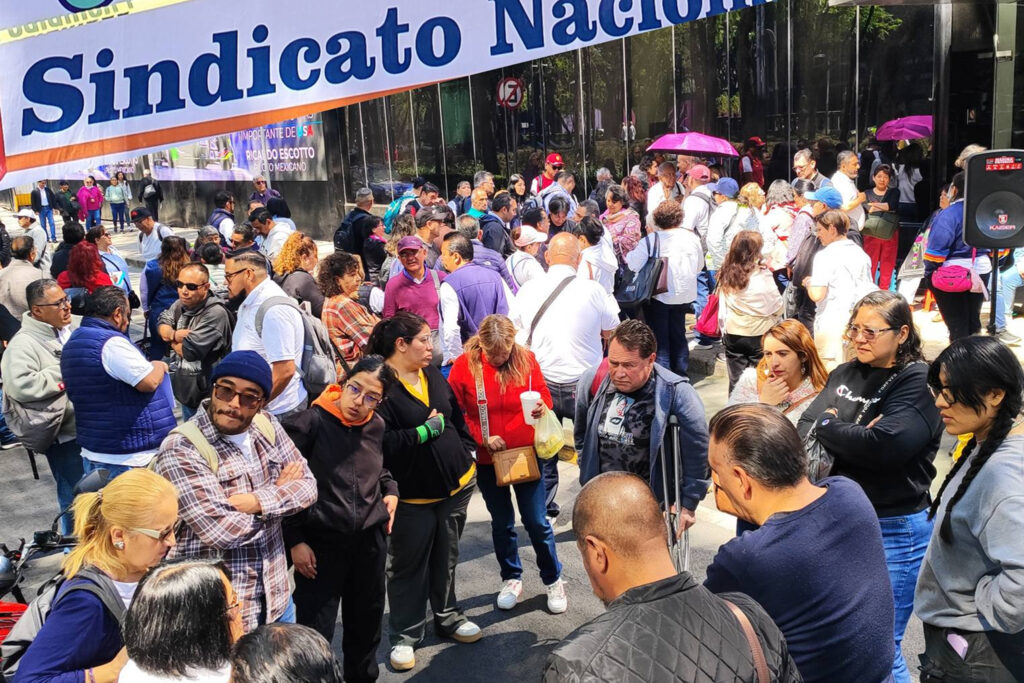Civil Society Orgs Demand Action on Soda Health Crisis at Mexico’s Senate
This article originally appeared in the October 28, 2025 edition of El Poder del Consumidor.
Civil society organizations, public health specialists and activists inflated a 5-meter-high soda can, replacing the brand logo with the word “diabetes” and adding a warning label: “Sweeteners are also harmful.”
This action was a strong call to the Senators of the Republic not to allow a rollback of the Special Tax on Production and Services (IEPS) applied to sugary and sweetened beverages, responsible for more than 230,000 new cases of diabetes and cardiovascular diseases each year.
Experts highlighted the importance of this tax measure as one of the most cost-effective ways to combat the growing epidemic of non-communicable diseases (NCDs) in Mexico. They emphasized that the direct and indirect costs associated with comorbidities related to overweight and obesity generate a catastrophic expense for the public treasury, estimated at approximately 2.0% of the Gross Domestic Product (GDP), noting that soft drink companies only pay 10% through the Special Tax on Production and Services (IEPS). This call came during the discussion of the Special Tax on Production and Services Law in the Joint Committees on Finance and Public Credit, and Legislative Studies, First.
Alejandro Calvillo, director of El Poder del Consumidor, stated: “Soft drink consumption in Mexico is one of the leading causes of diabetes and also contributes significantly to cardiovascular diseases, both of which are the leading cause of illness and death in the country. We pay the price with a healthcare system in crisis, unable to cope with the damage, just as our wallets, and especially those of the most vulnerable populations, cannot afford it.”
Paulina Magaña, a member of the Alliance for Food Health, stated: “ The high consumption of sugary drinks in Mexico constitutes one of the greatest threats to the country’s public health . It is estimated that this habit causes more than 230,000 new cases of diabetes and cardiovascular disease each year, in addition to approximately 46,000 deaths directly attributable to their consumption. These figures reflect the profound impact that sugary drinks have on the health of the Mexican population, significantly contributing to the development of chronic diseases that deteriorate quality of life and generate an unsustainable burden on the health system and families’ finances. We are at a historic moment in which the senators have the responsibility to protect the health of the Mexican population by approving the increase in taxes on healthy foods.”
For her part, Doré Castillo, director of the organization Salud Crítica and coordinator of the ContraPESO Coalition, stated: “Recently, the soft drink industry and the government agreed not to tax sweetened beverages and sugary drinks with the same tax. However, this is not an alternative that guarantees the kind of health improvements we need in Mexico. The World Health Organization advises against the use of sweeteners for weight control, and scientific studies warn of cardiometabolic risks from the frequent consumption of these flavoring additives. It is urgent to reduce the intake of beverages sweetened with any type of ingredient and promote water as the primary source of hydration.”
Regarding the costs associated with consuming these types of products, Iván Benhumea, coordinator of the Fiscal Justice Program at Fundar, Center for Analysis and Research, stated: “Large multinational corporations have accumulated exorbitant profits at the expense of the health of millions of Mexican families. While their profits grow, the rest of society must cover the damage. The data is compelling: obesity and overweight cost all of Mexican society approximately 600 billion pesos, which is equivalent to 68% of all the priority social programs of this administration. The soft drink industry has also overwhelmed our healthcare system: 20% of the entire federal health budget is allocated to treating cardiovascular diseases and diabetes, which are largely caused by the massive consumption of ultra-processed and addictive soft drinks. The 3-peso-per-liter tax on sugary drinks currently being debated in the Senate is a fundamental step, a minimum of justice that cannot be questioned.” “A step backwards.”
Finally, Alejandro Calvillo added: “The Senate has two options: protect corporate profits or protect public health . Not only do United Nations agencies, such as the WHO and UNICEF, recommend establishing high taxes on these products, but so do the World Bank and the Organisation for Economic Co-operation and Development (OECD), because not only is public health in crisis, but so are healthcare funds. There are not enough resources to address the epidemics of overweight, obesity, diabetes, and cardiovascular diseases, to which the consumption of these beverages contributes significantly.”
-
Yet Another Mexican Citizen Dies in ICE Custody
The unidentified victim is the 9th Mexican citizen to have been killed in ICE detention since the beginning of 2025; this time in Adelanto, California.
-
Let’s Talk About Migration: Trumpist Persection
Millions of women who have endured unspeakable violence on their migration journey are now being persecuted in the United States by an extremely xenophobic and misogynistic government, led by Donald Trump,
-
Culture | Labor | News Briefs
Workers Occupy Culture Secretariat, Demand 13% Wage Increase
2,000 workers have been receiving incomes below Mexico’s minimum wage for over two years.




